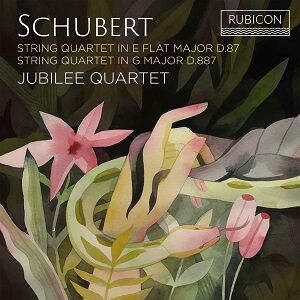
Franz Schubert (1797-1828)
String Quartet No.10 in E flat major D87
String Quartet No.15 in G major D887
Jubilee Quartet
rec. 2022, Potton Hall, Suffolk, UK
Reviewed as a digital download from a press preview
Rubicon Classics RCD1082 [79]
This is, without doubt, the bleakest, loneliest account of Schubert’s most bleak and lonely quartet I have heard. The almost maniacal tension in the playing of the Jubilee Quartet doesn’t relent for a moment. Even the gentler, more lieder like passages where other performances find some measure of consolation are here noteworthy more for their brittleness and vulnerability. It is an extraordinary, harrowing experience but not one I think I want to go through that often. Written in 1826, the quartet, in the hands of Jubilees, seems a road of despair, a young composer afflicted with an almost expressionist terror at the isolation of imminent death, that will climax in the catharsis of Winterreise the following year.
The technical refinement of the playing of the Jubilee Quartet allows them to register every tiny flicker of emotion with hair trigger sensitivity. The great yearning theme of the first subject after the opening chords is here bleached as white as an animal skull washed up on a beach, all vibrato removed.
Last year I gave the Recommended accolade to the Fitzwilliam Quartet’s mature, measured recording of the same quartet and this new version is the very antithesis of that world weary look into the abyss. There is room for both views even though ultimately I find the Fitzwilliams go deeper.
The scherzo is typical of the Jubilee approach. Any hint of jolliness is avoided as we are offered a portrait of a composer drumming his fingers nervously on the table top, every nerve strained. For once in this performance the trio does offer some relief but it proves illusory.
The finale becomes a near hysterical tangle of emotional impressions as though Schubert were being pursued by his demons to the edge of his personality breaking up, one second affably melodic, the next erupting into despair. The agitation is unrelenting and it is almost painfully disturbing to listen to another human being in this much distress. The subtlety and range of colour available to these remarkable musicians intensifies the sense of a bewildering diversity of emotions even further. There is an immense amount of beauty in their playing. It just tends to be of the stark and alienated variety. The very end of the finale, done with great finesse, offers no consolation whatsoever. It is very hard to banish a particularly grim, ferocious account of the slow movement, in particular, from the mind whilst listening to these bars. By contrast the Fitzwilliams offer a hard won, almost philosophical calm in these bars where the Jubilees seem to dangle an illusory relief. Both perspectives are powerful and valid and Schubert’s inspiration is capacious enough to accommodate both.
The coupling, sensibly placed before D887 – imagine following that! – is the much more lightweight early E flat quartet written when the composer was only 16. Even by Schubert’s precocious standards, it is a remarkably far sighted and mature work with a first movement of a breadth that foreshadows works such D887 to come. Thankfully, the Jubilees are able to wind down appropriately for the much mellower tone of this work though they are ever attentive to any tensions which cloud its expansive sky. In the development section of this opening movement they flirt with but never cross over into pushing this music harder than it can go.
I think they do cross that line in the merry japes of the second movement scherzo though I did enjoy their ‘funeral march for a doll’ tongue in cheek way with the humorously grim trio. Mercifully, they resist the temptation to make that trio prefigure that of the great C major String Quintet. The puppyish spree of the finale does collide somewhat with the opening of the G major that follows it but I suspect that was the intended effect: the shock of what had happened to the composer in the interim.
The great G major quartet will always be the main draw for this CD and this is a strikingly original view of it and one for which the Jubilee Quartet make the most trenchantly persuasive case. My preference remains for the very different approach taken by the Fitzwilliam Quartet but if you like your late Schubert raw and bleeding then I urge you to give this wonderful new version a try.
David McDade
Help us financially by purchasing from




















